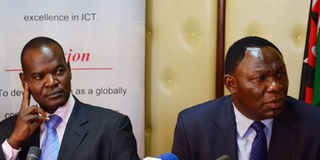Govt defends move to disable Royal Media transmitters

Information permanent secretary Bitange Ndemo (right) and Communication Commission of Kenya (CCK) secretary John Omo during a news conference February 6, 2013. The government defended its decision to disable 17 Royal Media Services frequencies. ANTHONY OMUYA
The government has defended its decision to disable 17 Royal Media Services frequencies.
Information and Communications permanent secretary Bitange Ndemo and Communications Commission of Kenya (CCK) company secretary John Omo said the frequencies were operating illegally and were a threat to the country’s airspace.
Addressing the weekly briefing on media monitoring Wednesday, Dr Ndemo told those unhappy with the shutting down should go to court instead of issuing inflammatory remarks.
“We are not politicians. We are civil servants. CCK is just exercising its mandate,” Dr Ndemo said.
There has been hue and cry from some quarters since CCK shut six frequencies belonging to Royal Media Services on Saturday for allegedly operating illegally. Eleven other frequencies were disabled on Sunday.
The Coalition for Reforms and Democracy (Cord) has termed the move as meant to rig the March 4 General Election, dictatorship and disregard of press freedom.
ODM secretary general Anyang’ Nyong’o questioned the timing of CCK's move.
“We know this is an attempt by some government officials to gag the media ahead of the elections,” he said.
He pointed out that RMS was targeted because its proprietor, Samuel Kamau (SK) Macharia is a member of Cord, which is headed by Prime Minister Raila Odinga.
On Wednesday, the Kenya Civil Aviation Authority director of safety and security Joe Mutungi said some operators had complained over interference in their communication by the illegal frequencies.
“In case of bad weather, our signals are usually affected if any unauthorised transmission is erected near our facilities and landing might not be safe,” Mr Mutungi said.
Mr Omo said the 17 RMS frequencies were not assigned by CCK.
RMS has further appealed against CCK’s intention to disable its 22 other frequencies and the case is still in court.
Mr Omo and Mr Ndemo said freedom of the media should not be freedom against the law.
On the timing of the CCK Act, they said, the court gave orders for the disabling of the 17 frequencies and that the law has to be followed despite the country being in an electioneering period.
“Freedom of the media cannot be used to do illegal things. This is impunity in name of freedom of media and should not be allowed to put lives of pilot and passengers in jeopardy. The law is the law, you cannot say we should postpone operation of the law because of elections,” Mr Omo said.
The PS and Mr Omo also said there should be fair and equal distribution of frequencies.
In total, there are 85 licensed FM stations in the country and 20 for television.
While announcing the shutting down of RMS frequencies, CCK Director-General Francis Wangusi said it confiscated transmitters in Nanyuki, Narok, Migori, Nakuru and Mwingi where the media house was “operating using self-assigned frequencies".
He said the six transmitters were part of 17 put up by RMS in the recent past without a licence from CCK, arguing that the broadcaster had acted in contravention of the law.
The transmitters are located in Karue hill, Vuria hill, Muranga-Gatare, Enchoro hill, Mukuyuni and Mambrui in Malindi.
However, CCK has denied allegations that the timing had any political connotation and it opted to deal with the issue before the next government comes to power.




